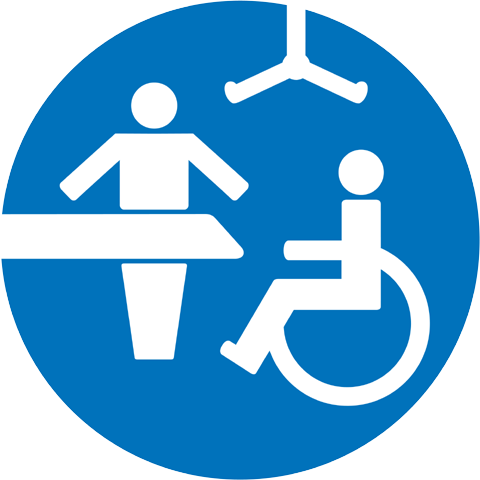Experience Reports
To be able to be out and about for our day-to-day activities just like everyone else, we need “changing places” across the area.
People with disabilities and their families give us an insight into their everyday lives and describe what “changing places” mean to them personally.
“If there is no suitable toilet on the way, there are only two possibilities: staying at home or improvising. Improvising then means, for instance, changing the incontinence products on the floor of a “normal” wheelchair-accessible toilet or in the luggage space of my own car. Really, this is unacceptable and undignified.”
Ursula Hofmann, mother of a severely disabled daughter and chairwoman of the Esslingen association “Rueckenwind e.V” (tailwind)
“If there is no such thing as a “changing place”, you have no chance to go to the toilet in the stadium (or anywhere else). I cannot be lifted out of the wheelchair “just like that” without a patient hoist.”
Pierre Mayer, ambassador of inclusion and fan of the VfB football team in Stuttgart
“To me, a “changing place” means more self-determination, independence and quality of life.”
Peter Maier, ambassador of inclusion and fan of the VfB football team in Stuttgart
“A “changing place” is a matter of the heart to me. All people who care for and have to lift a disabled adolescent or adult have back problems.”
Anett Haubold, mother of a severely disabled son and member of the Esslingen association “Rueckenwind e.V.“ (tailwind)
“The best suggestion in a long time: simply place a changing bench for adults and a patient hoist in a correspondingly large wheelchair-accessible toilet. My son always has his toilet with him - in the form of a diaper. What we need on the way, however, is changing benches for the diaper change.”
Dr Hans Joachim Keller, father of a severely disabled son and chairman of the Koerperbehinderten-Verein Stuttgart e.V. (association for people with disabilities)
“A stroll in the city with the whole family? This is something of a rarity for us. When our daughter was little, we sometimes went to the big city. But she was too big for a changing table for babies by then. We knew there was this department store with large changing rooms for wheelchair users. We used those from time to time to change our daughter´s diapers. We brought a large blanket and everything we needed for the diaper change. It was not the best possible solution, true, but it was the only possibility for us to go to town together at all. If we want to be out and about as a family, we need a “changing place”. There is just no other way.”
Petra Riegler, mother of a severely disabled daughter and member of the Esslingen association “Rueckenwind e.V.” (tailwind)
“Now imagine the following everyday life situation: We might be going shopping in town or meeting with friends in a café (if it is accessible). I know that after three hours at the latest, or perhaps earlier, the incontinence product needs changing.
But where and how?
You might be wondering why we do not use more highly absorbent diapers that need not be changed so often.
Well, the reason is the amount of liquid our son is given for his chronic lung disease together with the necessity to make sure he is not exposed to a humid environment for too long to reduce the risk of skin damage and pressure marks since he suffers from an already increased risk of decubitus. After all, there are people whose bladder needs to be emptied by means of catheterisation. This procedure, too, requires that the people lie down. But let me spare you further nursing details.
There is only one solution for us: “changing places”!”
Waltraud Spies-Baumeister, mother of a severely disabled son
“We need a “changing place” wherever people want to stay longer than five minutes. The reason is simple: you cannot be part of it with your pants full.”
Jutta Pagel-Steidl, Director of LVKM
Did you know?
The German title of the campaign „Changing Places“ is „Toiletten fuer alle“, „toilets for all“.
 →
→ 

